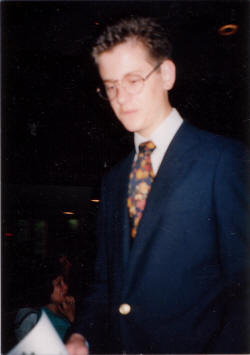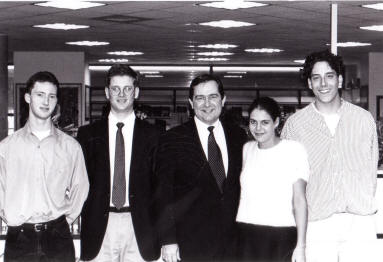I recently ended up in three leadership positions.
As of May, I am the lead for the ITS Web Technologies Team at SMU. This means I coordinate a 3 person team (including me) that maintains most technical aspects of SMU’s core multipurpose web servers, including our main server, www.smu.edu.

My shirt reads FUTURE PRESIDENT.
In April, I was elected president of the Lake Park Estates Neighborhood Association. This is a “close enough” fulfillment of an ambition to be elected into some public office before I turn 30. I’ve apparently had this ambition since I was 3; see the “FUTURE PRESIDENT” on my shirt.
Learning how to communicate to neighbors is interesting and fun. I’ve already taken one controversial stand on a very sensitive local issue, and I’ve come out unscathed–and may have even converted a couple of people.
In early 2006, I became a Assistant District Commissioner in the White Rock District of the Circle Ten Council of the Boy Scouts of America. (That’s a mouthful!) I help guide a small staff of Unit Commissioners in addition to being a Unit Commissioner myself for a couple of units.
Back up three paragraphs. Why do I want to be in an elected position?
Part of it comes from youth leadership experiences in Boy Scouts and Order of the Arrow. From that, and from the leadership training I received (such as JLTC), I learned that any idiot can be a good leader as long as he has a plan and knows how to motivate others. (“Idiot” unambiguously proves my qualifications!)

Fuzzy picture of me at the HOBY conference in 1993.
Part of it stems from an idealism partly instilled by a Hugh O’Brian Youth Leadership (HOBY) conference I attended as a high school sophomore. (I was floored when I found out my school chose me to go; I figured it would have gone to a “popular” kid.) That conference helped me understand that it is possible for me to do good and be a model elected representative.
Part of it derives from my general interest in politics. I was fascinated by my high school government course. Well before that, I discovered the world of radio political broadcasters. Yes, I was even a Dittohead for a while. (I outgrew Rush once I went to college.)
Finally, part of it comes from a desire to leave the world a better place than I found it. I see corruption, ineffectiveness, and wrong-headedness all the time, and I know there’s no excuse. I know I can do things differently and better.
But the real question is twofold: 1. am I qualified leader, and 2. can I do it?
Am I a qualified leader?

Me (2nd from left) with U.S. Rep.
Steve Stockman (R), who I was able to get to speak to the Teenage Republicans group at Clear Brook High School in the 1994-1995 school year. From left to right: Mark Gandin, Aren Cambre, Steve Stockman, Lisa Fox, Chris Bensch.
I was developing effective leadership skills before college. Not being especially popular, I never was elected president of much of anything, nor did I bother with student council. However, I still managed to create an impressive academic resume. Some highlights include that I was a founder of a short-lived Teenage Republicans group; I innovated a radical, new slideshow format for my annual high school band banquet (we did it all on VHS tape instead of with a projector); and I gained excellent access to school administrators through doing special projects or fixing their computers. Even the Computer Applications teacher was asking my guidance on how to run his class! I had a lot of success with leadership in Boy Scouts–at one point, I was even telling the Scoutmaster what to do–and I did a decent job with leadership-related tasks in other areas.
Something happened in college. I lost my edge. Completely. I did a future leader mentoring program through SMU’s Leadership Consulting Council my freshman year. This was a good experience, but it didn’t gel. The only real leadership positions I held were in APO, and even then, I didn’t do a fantastic job. Even the APO chapter president thought I was a crack whore! (There’s more to it than that. You’ll have to ask me in person.)
Looking back, the only partial regret about my SMU experience, leadership-wise, was that I spent too much time in the time-sapping SMU Mustang Band. I liked playing music, and I tolerated marching. However, I am not a party animal, I don’t drink (never have, still don’t), and I am not excited about spectator sports, so I was not a good cultural fit. I finally dropped band my senior year, but that was too late to get deeply involved in other organizations. I probably should have spent more time trying to get into areas where I can utilize my leadership like Student Senate. Speaking of, I technically got elected into the Student Senate 1-2 years after I graduated! I asked several people write me in while I was working on my Master’s degree. Interest was so low that I actually qualified to be an Engineering Senator. Unfortunately, only full time students may serve on the Student Senate, so they had to pass me up for the next person. I wouldn’t have had the time to do that, anyway.
After college, my leadership record has been mixed. I got involved in Boy Scouts again as a Chartered Organization Representative with a troop that wasn’t running well. I had limited success in getting things turned around, but in hindsight I see that I did not manage conflict very well. However, since then, I have had a better record with the Commissioners’ Staff, involvement in my neighborhood association and church, work, and other small successes.
I think I am getting my edge back, but does this mean things turning around? Time will tell.
Can I do it?
 Will I someday seek a “real” elected position? The more I think about it, the less I am sure. I value that my current employment doesn’t occupy my entire life. I have a good amount of quality hours off the job. I know lots of people for whom that isn’t the case, be it because of lengthy commutes, long work hours, fear of taking vacation time, excessive job duties, etc.
Will I someday seek a “real” elected position? The more I think about it, the less I am sure. I value that my current employment doesn’t occupy my entire life. I have a good amount of quality hours off the job. I know lots of people for whom that isn’t the case, be it because of lengthy commutes, long work hours, fear of taking vacation time, excessive job duties, etc.
Many elected positions occupy your entire life. Take the Texas Legislature, for example. Even though it only has regular sessions once every other year, the legislators live in Austin for around 5 consecutive months during the session, only returning for the weekends. That’s 5 months of separation from one’s family and home. Even officials elected to local offices seem to find their lives consumed with job responsibilities. That isn’t appealing, and it becomes even less appealing now that I have a family.
One thing is sure: I must finish my doctorate, and I don’t see that happening until the of 2007 at the very earliest, if I am lucky! I am carefully limiting my commitments because I do not want to jeopardize that degree. If I screw up this doctorate, I will regret it forever.
I leave you with a parting thought, just in case I end up in a position of authority:




 Will I someday seek a “real” elected position? The more I think about it, the less I am sure. I value that my current employment doesn’t occupy my entire life. I have a good amount of quality hours off the job. I know lots of people for whom that isn’t the case, be it because of lengthy commutes, long work hours, fear of taking vacation time, excessive job duties, etc.
Will I someday seek a “real” elected position? The more I think about it, the less I am sure. I value that my current employment doesn’t occupy my entire life. I have a good amount of quality hours off the job. I know lots of people for whom that isn’t the case, be it because of lengthy commutes, long work hours, fear of taking vacation time, excessive job duties, etc.